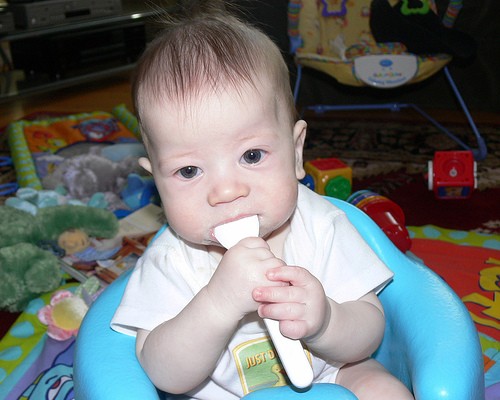
Spoon-feeding can contribute widely to childhood obesity, researchers warn parents.
Any time between four and six months after birth is the best time to introduce solid foods to babies. Spoon-feeding is one of the most popular methods adopted by majority of the parents to wean their baby onto solid food. However, according to a new study, spoon-fed infants are at a greater risk of putting on unnecessary weight and becoming overweight as toddlers, compared to the infants who are allowed to eat food themselves.
Dr Amy Brown and Michelle Lee from the Swansea University in the UK found that providing freedom during meals helped prevent overeating and excess fat.
The study included 298 babies. Researchers monitored the methods parents used to introduce solid foods to their little ones. Parents adopted either baby-led weaning (allowing infants to feed themselves) or spoon-feeding. Baby-led weaning encourages babies to choose their food and eat mainly whole foods than pureed ones. Weight and eating style of the children were analysed between 18 and 24 months.
Toddlers who followed the baby-led weaning method during infancy had healthier weight than spoon-fed babies. Practising self-feeding had helped them develop the ability to stop eating when their tummy was full. Additionally, children in the baby-led weaning approach were less fussy than the latter.
Researchers concluded that allowing babies to eat food themselves during the early stages of growth helps prevent unnecessary weight gain, through promoting appetite regulation.
"The study indicates that taking a baby-led approach to weaning may reduce a baby's risk of being overweight as they are in control of their food intake. This results in the baby being better able to control his or her appetite which could have a long-term impact upon weight gain and eating style that may continue into childhood," researcher Dr Brown, said in a news release.
"Responsive feeding, which means allowing the child to regulate their own appetite and not pressurising them to eat more than they need, is a really important step in encouraging children to develop healthy eating patterns for life."
The study has been published in the journal Pediatric Obesity.
Research in the past has shown several benefits associated with allowing babies to explore their meal and eat themselves. A team of American scientists reported in December, last year that messing up with food, while sitting in a highchair helped building a strong vocabulary early in life, facilitating cognitive development and functioning, in the following stages of growth.









